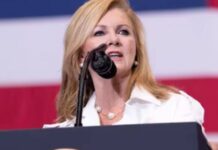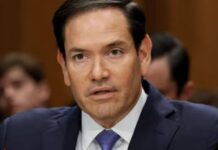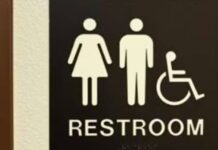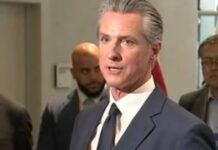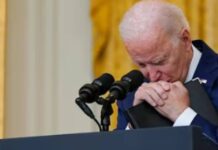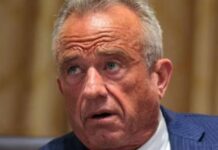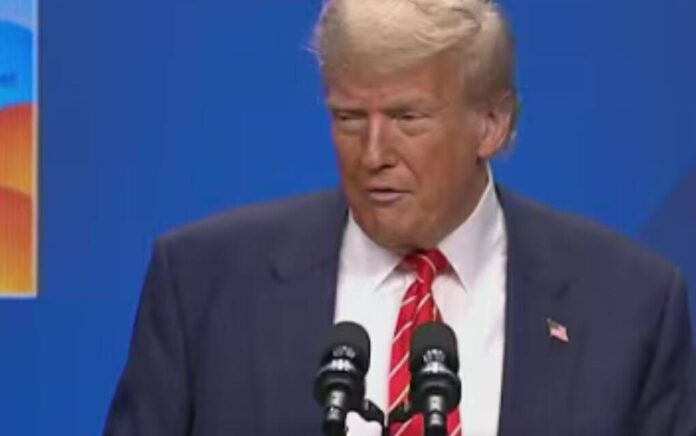
Trump just keeps on winning. He did promise that he would after all.
And Democrats are melting down because of this victory Donald Trump was handed from NATO.
The global security landscape is undergoing a profound shift, with NATO at its core, driven by the forceful influence of U.S. President Donald Trump and Russian President Vladimir Putin. Their actions, set against the backdrop of Russia’s war in Ukraine, have catalyzed rapid changes within the alliance, sparking debates about their permanence and impact on transatlantic unity.
Last month, NATO captured global attention when most of its 32 member nations committed to raising defense spending to 5% of their GDP, a significant jump from the prior 2% target. This move followed Trump’s surprising pivot, declaring NATO was no longer a “rip-off.”
Yet, his earlier criticisms had already begun reshaping the alliance’s operations. “Trump has changed the game,” said Peter Doran, a adjunct senior fellow at the Foundation for Defense of Democracies. “[Then] there’s Vladimir Putin, who has clearly awakened the Europeans to the danger that Russia presents to them.”
Trump’s frustration with NATO’s uneven spending began in his first term, when he noted only five allies met the 2% GDP defense pledge. His rhetoric sharpened during the 2024 campaign, amplified by Russia’s aggression in Ukraine.
Questions swirled about whether the U.S. would remain a steadfast supporter of Ukraine and a reliable European partner against Russia. Trump’s provocative stance—threatening to shift U.S. troops from Europe to Asia and hinting he might not defend an attacked ally—stunned the alliance.
At a February 2024 campaign event, he stated, “You don’t pay your bills; you get no protection. It’s very simple,” adding, “I would encourage them to do whatever the h*ll they want” regarding a potential attack on a NATO nation by Russia.
Yet, this blunt approach delivered results. NATO Secretary-General Mark Rutte, who shares a positive rapport with Trump, playfully acknowledged his unorthodox style. Referencing Trump’s rant about a faltering Iran-Israel ceasefire, Rutte said, “Daddy has to sometimes use strong language.” Rutte highlighted the disruptive yet effective nature of his diplomacy.
“Donald Trump’s a real contrast to Joe Biden,” Peter Rough, director of the Hudson Institute’s Center on Europe and Eurasia, said to Fox News Digital. “Joe Biden bear hugged the NATO allies to the point of smothering them with adoration, and that caused them, I think, to sit back and relax a little bit.”
“Donald Trump, by contrast, exposes the allies to just enough hostile power to encourage them to do more, but it doesn’t expose them so much that it might invite a Russian attack. And I think that’s the art of the deal, so to speak.”
While Trump’s pressure has spurred allies to boost defense budgets, Putin’s actions have been equally critical in revitalizing NATO. Russia’s 2022 invasion of Ukraine jolted the alliance, prompting reforms even before Trump’s return to office.
“If Vladimir Putin and the Russians in the post-Cold War period had sought to engage Europe and chosen more of a democratic future, there might not be a NATO Alliance today,” Rough stated. “But Putin has given NATO a real reason to exist, and President Trump has done his part by… cajoling, pushing, nudging the allies.”
Not everyone is sure that these changes will be permanent. Mike Ryan, former Deputy Assistant Secretary of Defense for European and NATO Policy, told Fox News Digital that while Trump and Putin have “energized and focused [the] allies,” such shifts are typical during external crises. He remains skeptical about lasting transformation.
Trump’s re-election initially raised fears of a U.S. return to pre-World War II isolationism. Doran dismisses these concerns:
“The answer is very clearly no. If anything, Trump came back and did exactly the same thing he did in the first administration, and that was to remind the Europeans that they are chronically under-spending on defense. If anything, Trump hasn’t changed at all. It’s the Europeans’ awareness that they need to spend more, and they have responded positively to that challenge, and that is very encouraging.”
Rough, however, cautions about maintaining balance. “Donald Trump’s created a lot of anxiety in Europe, and it’s important to convert that anxiety into policy wins,” he explained.
“If that anxiety is allowed to linger or is exacerbated or made worse, then one could see some European states push more for so-called strategic autonomy, or a separation from the U.S. But if that anxiety translates to… real policy victories and partnerships with Europe, then I think it can be a healthy thing.”
As NATO navigates this pivotal moment, Trump’s provocative leadership and Putin’s aggression have forced the alliance to confront its vulnerabilities and adapt with unprecedented urgency. Whether these changes will endure remains uncertain, but NATO stands reshaped, poised at the edge of a new era in global security.
Stay tuned to The Federalist Wire.


